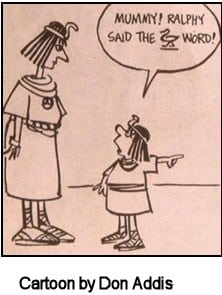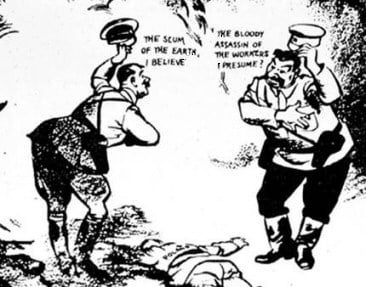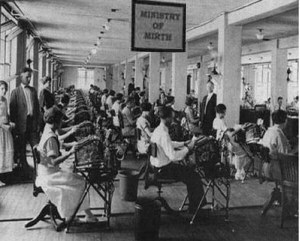
Funny History Jokes
Will and Guy are convinced that humor, laughter, and jokes have been with us since the beginning of human life on Earth, and we would like to share some jokes with you that have a historical background.
Funny Historical Facts, Jokes, Trivia and Fun

Aristotle felt that laughter was a distinctive trait of humanity and one that distinguished humans from animals.
Harty Tarty
Did you know that the eighth Duke of Devonshire, known to his friends as “Harty Tarty”, was told off by Queen Victoria for picking his nose at dinner? A poor shot, he once killed a pheasant and his gun-dog and wounded two bystanders [one of whom was his chef] with a single cartridge.
Cunning Balduf
Baldulf, the medieval soothsayer, prophesied to the king that his favorite mistress would soon die. Sure enough, the woman died a short time later. The king was outraged at the soothsayer, certain that his prophecy had brought about the woman’s death. He summoned Baldulf and commanded him, ‘Tell me when you will die!’
Baldulf realized that the king was planning to execute him straightaway, no matter what answer he gave. ‘I do not know when I will die,’ he cleverly answered finally. ‘I only know that whenever I do die, you will die two days later.’
Guy’s Favourite History Funny
A busload of tourists arrives at Runnymede*. They gather around Robin, the guide, who explains, ‘This is the spot where the Barons forced King John to sign the Magna Carta.’
A fellow at the front of the group asks, ‘When did that happen?’
‘1215,’ answers Robin the guide.
The man looks at his watch and says, ‘Gee, hey everybody – we just missed it by a half hour.’
Footnote: *The Runnymede meadows are on the banks of the river Thames, in the county of Berkshire, England. Fortunately, the land is now owned and preserved by the National Trust.
Another True Story of an American Tourist
Mary Pembarthy, a guide at Windsor Castle, told Will and Guy this allegedly true story about what she heard last month when ‘on duty’.
Mary was struggling to make herself heard over the roar of low-flying aircraft coming into land at nearby London Heathrow Airport, one of the busiest in the world.
She was interrupted by an elderly American tourist who demanded what was wrong with the town planners, and why had they built the Royal Castle so close to the airport.
The Ministry Of Mirth – A Government Agency

You may be further amused to learn that in 1953 Australia created the Ministry of Mirth as part of their government structure. Their role was to find humor in the changes brought about by the government and present that information to the public in an amusing and acceptable way.
We have managed to find an old photo of the Ministry of Mirth at work. Don’t they look happy?
Short, True, Funny Story from 19th Century London
Robert Devonshire, a middle-aged Londoner from Hackney, was faced with a difficult decision when choosing between two lovely ladies, Anna and Mary, both willing to join him in matrimony.
Although not particularly a religious man, Robert Devonshire found his way into St Martin’s church and, kneeling down to pray, he asked God for advice on whether he should have Anna or Maria for his wife.
When Mr Devonshire got up he was most pleased to see that the Almighty had put the answer right before his eyes: ‘Ave Maria.’
He left the church a delighted man.
A Witty and Funny Old Joke from a History Lesson in the USA

In an American history discussion group, Professor Langer was trying to explain how society’s ideal of beauty changes with time. ‘For example, he said, ‘take the 1921 Miss America. She stood five feet, one-inch tall, weighed 108 pounds, and had measurements of 30-25-32. How do you think she’d do in today’s version of the contest?’
The class fell silent for a moment. Then Freddie piped up, ‘Not very well.’ ‘Why is that?’ asked Professor Langer. ‘For one thing,’ Freddie added, ‘She’d be way too old.’
Five Hilarious, Short, and Funny History Exam Answers by Children
- The sun never set on the British Empire because the British Empire is in the East and the sun sets in the West. Queen Victoria was the longest queen. She sat on a thorn for 63 years. Her reclining years and finally the end of her life were exemplary of a great personality. Her death was the final event that ended her reign.
- During the Renaissance America began. Christopher Columbus was a great navigator who discovered America while cursing about the Atlantic. His ships were called the Nina, the Pinta, and the Santa Fe. Later the Pilgrims crossed the Ocean, and that was called the Pilgrim’s Progress. When they landed at Plymouth Rock, they were greeted by Indians, who came down the hill rolling their hoops before them. The Indian squabs carried their cabooses, which proved very fatal to them. The winter of 1620 was a hard one for the setters. Many people died and many babies were born. Captain John Smith was responsible for all this.
- France was in a very serious state. The French Revolution was accomplished before it happened. The Marseillaise was the theme of the French Revolution, and it catapulted into Napoleon. During the Napoleonic Wars, the crowned heads of Europe were trembling in their shoes. Then the Spanish gorillas came down from the hills and nipped at Napoleon’s flanks. Napoleon became ill with bladder problems and was very tense and unrestrained. he wanted an heir to inherit his power but since Josephine was a baroness, she couldn’t bear him any children.
- In medieval times most of the people were alliterate. The greatest writer of the time was Chaucer, who wrote many poems and verse and also wrote literature. Another tale of William Tell, who shot an arrow through an apple while standing on his son’s head.
- In the Olympic Games, Greeks ran races, jumped, hurled the biscuits, and threw the java. The reward to the visitor was a coral wreath. The government of Athens was democratic because the people took the law into their own hands. There were no wars in Greece, as the mountains were so high that they couldn’t climb over to see what their neighbors were doing. When they fought the Parisians, the Greeks were outnumbered because the Persians had more men.
Ten Hilarious, Clever, Funnies: Mothers In History

- Michelangelo’s Mother: Can’t you paint on walls like other children? Do you have any idea how hard it is to get that stuff off the ceiling?
- Paul Revere’s Mother: I don’t care where you think you have to go, young man, midnight is past your curfew.
- Mona Lisa’s Mother: After all that money your father and I spent on braces, that’s the biggest smile you can give us.
- George Washington’s Mother: The next time I catch you throwing money across the Potomac, you can kiss your allowance goodbye.
- Mary’s Mother: I’m not upset that your lamb followed you to school, but I would like to know how he got a better grade than you.
- Columbus’s Mother: I don’t care what you’ve discovered, you still could have written.
- Napoleon’s Mother: All right, if you aren’t hiding your report card inside your jacket, take your hand out of there and show me.
- Thomas Edison’s Mother: Of course I’m proud that you invented the electric light bulb. Now turn it off and get to bed.
- Abraham Lincoln’s Mother: Again with the stovepipe hat? Can’t you just wear a baseball cap like the other kids?
- Albert Einstein’s Mother: But it’s your senior picture. Can’t you do something about your hair? Styling gel, mousse, something…?
- An extra laugh for posterity: Jonah’s Mother: That’s a nice story. Now tell me where you’ve really been for the last forty years.
Witty ‘Punch’ History Cartoon

Hitler and Stalin in a Punch cartoon meeting over the prostrate body of Poland which Germany and the USSR invaded in 1939.
Jack and Jill Went up the Hill to Fetch a Pail of Water
Jack fell down and broke his crown And Jill came tumbling after. Up got Jack, and home did trot As fast as he could caper He went to bed and bound his head With vinegar and brown paper.
The roots of this child’s nursery rhyme in France and the Jack and Jill referred to are Louis XVI who was beheaded [lost his crown] followed by his Queen Marie Antoinette [who came tumbling after]. The words and lyrics were made more palatable for the nursery by giving it a happy ending and have further been altered by the passage of time. The actual beheadings occurred in 1793. The first publication date for the lyrics of this nursery rhyme is 1795 which tie-in with the history and origins
The Knight and the King
A knight and his men return to their castle after a hard day of fighting.
‘How are we faring?’ asks the king. ‘Sire,’ replies the knight. ‘I have been robbing and pillaging on your behalf all day, burning the towns of your enemies in the west.’
‘What?’ shrieks the king. ‘I don’t have any enemies to the west.’ ‘Oh,’ says the knight. ‘Well, you do now.’
Ten More Assorted Random, Useless, Hilarious, and Funny Historical Trivia and Fun Facts
- The Romans ate lead as a cure for diarrhea. Lead is poisonous and thus killed off the entire Roman upper class within two centuries.
- George Washington’s “wooden” dentures were reputedly made from hippopotamus ivory and were mounted on gold.
- Queen Elizabeth I of England was completely bald. She lost her hair after suffering from smallpox at the age of 29. To disguise her loss she always wore a wig.
- After failing to cure the daughter of Emperor Yizong [860-874] of a fever, the 20 best doctors in China were all beheaded.
- William Pitt the Younger [1759-1806], former British Prime Minister, was advised by his doctors to cure his gout by drinking a bottle of port a day. He died from cirrhosis of the liver, aged 46.
- When the grey exterior of the Presidential mansion was painted white to cover the fire damage caused by British forces in the War of 1812, the change in colour brought about the change in the name of the building to the White House.
- The designer of the Statue of Liberty, French sculptor Frederic-Auguste Bartholdi, used his wife as the model for the body and his mother as the model for the face.
- In the nursery rhyme *Jack and Jill, Jack represented the French King, Louis XVI, and Jill, his wife, was Marie Antoinette.
- In 1912 the Titanic was sailing at 22 knots when she hit the iceberg.
- George Washington wrote in 1774 that ‘no thinking man’ in America wanted independence from England.
Funny Historical Truths
Carrying a Bouquet When Getting Married
Most people got married in June because they took their yearly bath in May, and still smelled pretty good by June. However, they were starting to smell, so brides carried a bouquet of flowers to hide the body odor. Hence the custom today of carrying a bouquet when getting married.
Don’t Throw the Baby Out the BathWater
Baths consisted of a big tub filled with hot water. The man of the house had the privilege of the nice clean water, then all the other sons and men, then the women, and finally the children. Last of all the babies. By then the water was so dirty you could actually lose someone in it. Hence the saying, ‘Don’t throw the baby out with the bath water.’
It’s Raining Cats and Dogs
Houses had thatched roofs-thick straw-piled high, with no wood underneath. It was the only place for animals to get warm, so all the cats and other small animals (mice, bugs) lived on the roof. When it rained it became slippery and sometimes the animals would slip off the roof. Hence the saying ‘It’s raining cats and dogs.’
Canopy Beds
There was nothing to stop things from falling into the house. This posed a real problem in the bedroom where bugs and other droppings could mess up your nice clean bed. Hence, a bed with big posts and a sheet hung over the top afforded some protection. That’s how canopy beds came into existence.
The floor was dirty. Only the wealthy had something other than dirt. Hence the saying ‘dirt poor.’
More Funny Historical Truths
Thresh Hold
The wealthy had slate floors that would get slippery in the winter when wet, so they spread thresh (straw) on the floor to help keep their footing. As the winter wore on, they added more thresh until when you opened the door it would all start slipping outside. A piece of wood was placed in the entranceway. Hence the saying a ‘thresh hold.’
Pick Up The Gauntlet
This was the situation: Abraham Thornton was accused of having drowned Mary Ashford, but he was acquitted by the jury. This acquittal did not satisfy popular feeling, and the brother of Mary Ashford appealed.
Now Thornton was well advised as to his next proceeding, and, following the still existent law of this early time of which I write, he went to Westminster Hall, where he threw down, as a gage of battle, an antique gauntlet without fingers or thumb, of white tanned skin ornamented with silk fringes and sewn work, crossed by a narrow band of leather, the fastenings of leather tags and thongs.
This done, he declared himself ready to defend himself in a fight, and so to uphold his innocence, saying that he was within his rights and that no judge could compel him to come before a jury.
This was held to be good and within the law, so Abraham Thornton won his case, as the brother refused to pick up the gauntlet. The scandal of this procedure caused the abolishment of the trial by battle, which had remained
in the country’s laws from the time of Henry II, until 1819.
In the words of Dion Clayton Calthrop on Richard I.
Peas Porridge Hot
In those old days, they cooked in the kitchen with a big kettle that always hung over the fire. Every day they lit the fire and added things to the pot. They ate mostly vegetables and did not get much meat.
They would eat the stew for dinner, leaving leftovers in the pot to get cold overnight and then start over the next day. Sometimes stew had food in it that had been there for quite a while. Hence the rhyme, ‘Peas porridge hot, peas porridge cold, peas porridge in the pot nine days old.’
Chew the Fat
Sometimes they could obtain pork, which made them feel quite special. When visitors came over, they would hang up their bacon to show off. It was a sign of wealth that a man could ‘ bring home the bacon.’ They would cut off a little to share with guests and would all sit around and ‘chew the fat.’
Those with money had plates made of pewter. Food with high acid content caused some of the lead to leach onto the food, causing lead poisoning and death. This happened most often with tomatoes, so for the next 400 years or so, tomatoes were considered poisonous.
Bread was divided according to status. Workers got the burnt bottom of the loaf, the family got the middle, and guests got the top, or ‘upper crust.’
Holding a ‘Wake’
Lead cups were used to drink ale or whisky. The combination would sometimes knock the imbibers out for a couple of days. Someone walking along the road would take them for dead and prepare them for burial. They were laid out on the kitchen table for a couple of days and the family would gather around and eat and drink and wait and see if they would wake up. Hence the custom of holding a ‘wake.’
The ‘Graveyard Shift’
England is old and small and the local folks started running out of places to bury people. So they would dig up coffins and would take the bones to a ‘bone-house’ and reuse the grave. When reopening these coffins, 1 out of 25 coffins were found to have scratch marks on the inside and they realized they had been burying people alive. So they would tie a string on the wrist of the corpse, lead it through the coffin and up through the ground, and tie it to a bell. Someone would have to sit out in the graveyard all night (the ‘graveyard shift’) to listen for the bell. Thus, someone could be ‘saved by the bell’ Also they could be considered a ‘dead ringer.’
Five Favourite History Shorts
- When tea was first introduced to England, people threw away the liquid and ate the leaves, seasoned with salt and pepper.
- The Duke of Wellington had one of the hooves of his horse Copenhagen that he had ridden at Waterloo sawn off and made into an inkwell.
- In 1618, King James I, King of England, decreed that people could do certain sports after church worship on a Sunday.[Puritans later burned James’s declaration.]
- Canada is a country whose main exports are hockey players and cold fronts. Our main imports are baseball players and acid rain. – Pierre Trudeau [former Prime Minister of Canada]
- In September 2001, the Democratic Republic of the Congo discovered that it had 21,652 civil servants on its payroll who did not exist.
There is a Bit of History Buff In All of Us – More Funny Historical
Truths
Randy Trobaugh kindly researched the history of these fascinating sayings.
Cost an Arm and a Leg
In George Washington’s days, there were no cameras. One’s image was either sculpted or painted. Some paintings of George Washington showed him standing behind a desk with one arm behind his back while others showed both legs and both arms. Prices charged by painters were not based on how many people were to be painted, but by how many limbs were to be painted. Arms and legs are ‘limbs,’ therefore painting them would cost the buyer more. Artists know hands and arms are more difficult to paint. Hence the expression, ‘Okay, but it’ll cost you an arm and a leg.’
Big Wig
As incredible as it sounds, men and women took baths only twice a year (May and October) Women kept their hair covered, while men shaved their heads (because of lice and bugs) and wore wigs. Wealthy men could afford good wigs made from wool. They couldn’t wash the wigs, so to clean them they would carve out a loaf of bread, put the wig in the shell, and bake it for 30 minutes. The heat would make the wig big and fluffy, hence the term ‘big wig.’ Today we often use the term ‘here comes the Big Wig’ because someone appears to be or is powerful and wealthy.
Chair Man
In the late 1700s, many houses consisted of a large room with only one chair. Commonly, a long wide board folded down from the wall and was used for dining. The ‘head of the household’ always sat in the chair while everyone else ate sitting on the floor. Occasionally a guest, who was usually a man, would be invited to sit in this chair during a meal. To sit in the chair meant you were important and in charge. They called the one sitting in the chair the ‘chairman.’ Today in business, we use the expression or title ‘Chairman’ or ‘Chairman of the Board.’
Losing Face
Personal hygiene left much room for improvement. As a result, many women and men had developed acne scars by
adulthood. The women would spread bee’s wax over their facial skin to smooth out their complexions… When they were speaking to each other, if a woman began to stare at another woman’s face she was told, ‘Mind your own bee’s wax.’ Should the woman smile, the wax would crack, hence the term ‘crack a smile’. In addition, when they sat too close to the fire, the wax would melt. Hence the expression ‘losing face.’
Go Sip
Early politicians required feedback from the public to determine what the people considered important. Since there were no telephones, TVs, or radios, the politicians sent their assistants to local taverns, pubs, and bars. They were told to ‘go sip some ale’ and listen to people’s conversations and political concerns. Many assistants were dispatched at different times. ‘You go sip here’ and ‘You go sip there.’ The two words ‘go sip’ were eventually combined when referring to the local opinion and, thus we have the term ‘gossip.’
Mind your P’s and Q’s
At local taverns, pubs, and bars, people drank from pint and quart-sized containers. A bar maid’s job was to keep an eye on the customers and keep the drinks coming. She had to pay close attention and remember who was drinking in ‘pints’ and who was drinking in ‘quarts’. Hence the term ‘minding your ‘P’s and Q’s ‘
Brass Monkey
In the heyday of sailing ships, all warships and many freighters carried iron cannons. Those cannons fired round iron cannon balls. It was necessary to keep a good supply near the cannon. However, how to prevent them from rolling about the deck? The best storage method devised was a square-based pyramid with one ball on top, resting on four resting on nine, which rested on sixteen. Thus, a supply of 30 cannon balls could be stacked in a small area right next to the cannon… There was only one problem…how to prevent the bottom layer from sliding or rolling from under the others. The solution was a metal plate called a ‘Monkey’ with 16 round indentations.
However, if this plate were made of iron, the iron balls would quickly rust it. The solution to the rusting problem was to make ‘Brass Monkeys.’ Few landlubbers realize that brass contracts much more and much faster than iron when chilled.
Consequently, when the temperature dropped too far, the brass indentations would shrink so much that the iron cannonballs would come right off the monkey. Thus, it was quite literally, ‘Cold enough to freeze the balls off a brass monkey.’ All this time, you thought that was an improper expression, didn’t you?
The Holy Grail of Historical Truth

Funny Ancient History Jokes
Will and Guy are convinced that humor, laughter, and jokes have been with us since the beginning of human life on earth, and we would like to share some jokes with you that have a historical background.
Humor in Antiquity
It’s easy to imagine that joke books are a modern phenomenon. Not so!
Philogelos, or ‘The Laughter Lover’, a book of wisecracks, was probably compiled in the fourth or fifth century AD. Written in Greek, it contains around 260 short jokes. Nobody knows who originally put it together or why. A Roman stand-up’s aide memoire? Or maybe a Roman Will and Guy?
Roman Jokes from The Laughter Lover
Slaves!
A wealthy man buys a slave, who dies shortly afterward, so he complains to the slave’s former owner, “Hey! That slave you sold me. He died.” “Goodness me,” he replies. “He never did that when I owned him.”
Credibility
A man meets an acquaintance and says, “It’s funny. I was told you were dead.” The acquaintance replies, “Well, you can see I’m still alive.” But the first man argues, “You must be dead because the chap who told me you were dead is much more reliable than you.”
Tell Your Fortune?
A man who had just returned from traveling abroad consulted an incompetent astrologer about his family. “How are they?” he asked. “They’re all fine,” the astrologer replied, “especially your father. “But he’s been dead for 10 years!” exclaimed the man. “You obviously don’t know who your father is then,” retorted the astrologer.
The Perfect Guest
A boffin was invited to a dinner party but wouldn’t eat anything. “Why aren’t you eating?” asked a fellow guest. “I didn’t want anyone thinking I’d only come for the food.”
Six Further Examples from The Laughter Lover – [Philgelos]
- An intellectual, falling sick, had promised to pay the doctor if he recovered. When his wife nagged at him for drinking wine while he had a fever, he said, ‘Do you want me to get healthy and be forced to pay the doctor?’
- An intellectual caught sight of a deep well on his country-estate, and asked if the water was any good. The farmhands assured him that it was good and that his own parents used to drink from that well. The intellectual expressed his amazement: ‘How long were their necks if they could drink from something so deep!’
- An intellectual came to check in on a friend who was seriously ill. When the man’s wife said that he had “departed”, the intellectual replied: ‘When he arrives back, will you tell him that I stopped by?’
- A glutton betrothed his daughter to another glutton. Asked what he was giving her as a dowry, he replied: ‘A house whose windows face the bakery.’
- While a misogynist was paying his last respects to his wife, someone asked him: ‘Who has gone to rest? He replied: ‘Me, now that I’m alone.’
- A barber, an absent-minded professor, and a bald man go on a long journey together and have to camp out overnight so they decide to take turns to watch the luggage. The barber volunteers for the first watch while the other two sleep but soon gets bored so he decides to pass the time by shaving the professor’s head. When his shift is up he wakes the professor who pats his head and exclaims, ‘God, that barber is a real idiot, he’s woken up baldy instead of me.’
Ancient Humour Durability
Not all the Laughter-lover jokes stand the test of time, some involve a scholastikos (absent-minded professor or boffin) who uses his great intellect to reach the wrong conclusion, eg a boffin went for a dip and almost drowned. He swore he’d never go near water again until he’d learned to swim.
Others mock different nationalities, rather like ‘Irish ‘ gags, eg, A farmer from Kyme was in the market, selling honey. The customer, after tasting it, complimented him on how good it was. “Damn right it’s good,’ replied the farmer. ‘I wouldn’t be selling it if that mouse hadn’t gone and died in it!”
Our Top Ten Hilarious, Funny, Witty, and Short Jokes from History
The Philgelos or “Laughter-lover” is probably the oldest compilation of jokes in existence; it contains some 265 jokes. It is said that the famous Monty Python Parrot sketch has its origins in a joke told in the Philogelos.
- Why were the early days of history called the Dark Ages? Because there were so many knights.
- It appears that the shortest war on record was between Zanzibar and Britain in 1896. Zanzibar [now part of Tanzania] surrendered after 38 minutes.
- What kind of lighting did Noah use for the ark? Floodlights and Ark lights
- Which English King invented the fireplace? Alfred the Grate.
- How was the Roman Empire cut in half? With a pair of Caesars.
- I’m desperately trying to establish why kamikaze pilots wore helmets.
- The last words from a general in the American Civil War, ‘Nonsense. They couldn’t hit an elephant at this dist……………’
- Asked by the court barber how he wanted his hair cut, the king replied, ‘In silence.’ [From the Philogelos]
- What’s the difference between Joan of Arc and a canoe? One is Maid of Orleans and the other is made of wood. [The Victorians enjoyed jokes like this one]
- Wishing to teach his donkey not to eat, a pedant did not offer him any food. When the donkey died of hunger, he said, ‘I’ve had a great loss. Just when he had learned not to eat, he died.’ – Dated to the *Philogelos 4th Century CE]
One that almost got away: Why did Henry VIII have so many wives? He liked to chop and change.
Funny Archaeology Jokes
Funny Archaeological Facts, Jokes, Trivia and Fun
“In a thousand years archaeologists will dig up tanning beds and think we fried people as punishment.” Olivia Wilde

Archaeological Funnies
- Archaeologists are fickle. They’re always dating other people.
- “Anyone who fails to see the evolutionary link between man and ape has never used the restroom at a Walmart.” Mia Dambrigo
- Most mothers tell their daughters to marry doctors… I told
mine to marry an archaeologist because the older she gets, the more interested he will be in her. - Question: What did Richard III say when a planning proposal was submitted for building a car park…
Answer: “Over my dead body” - Two archaeologists were excavating a tomb in Egypt. 1st Archaeologist: I just found another tomb of a mummified pharaoh! 2nd Archaeologist: Are you serious? 1st Archaeologist: No bones about it!
- Q: Why did the archaeologist go bankrupt?
A: Because his career was in ruins. - Q: What do you get in a 5-star pyramid?
A: A tomb with a view.
Bad Bet?
An archaeologist was digging in the Negev Desert in Israel and came upon a casket containing a mummy. After examining it, he called the curator of a prestigious natural history museum.
“I’ve just discovered a 3,000-year-old mummy of a man who died of heart failure!” the excited scientist exclaimed.
The curator replied, “Bring him in. We’ll check it out.”
A week later, the amazed curator called the archaeologist. “You were right about the mummy’s age and cause of death. How in the world did you know?”
“Easy. There was a piece of paper in his hand that said, ‘10,000 Shekels on Goliath’.”
Keeping the Score
Julius Caesar is addressing the crowd in the Coliseum. ‘Friends, Romans, and countrymen. I have returned from my campaign in France where I killed 50,000 Gauls!’ The crowd rises to its feet cheering, ‘Hail mighty Caesar!’ At this point, Brutus jumps up and yells, ‘Caesar lies. I’ve discovered he only killed 25,000!’ Caesar replies, ‘Yes, but remember that away Gauls count double in Europe.’
Archaeological Funny Tummy
The archaeologist who accidentally ate one of his tools had an upset stomach, not to mention irregular trowel movements.






